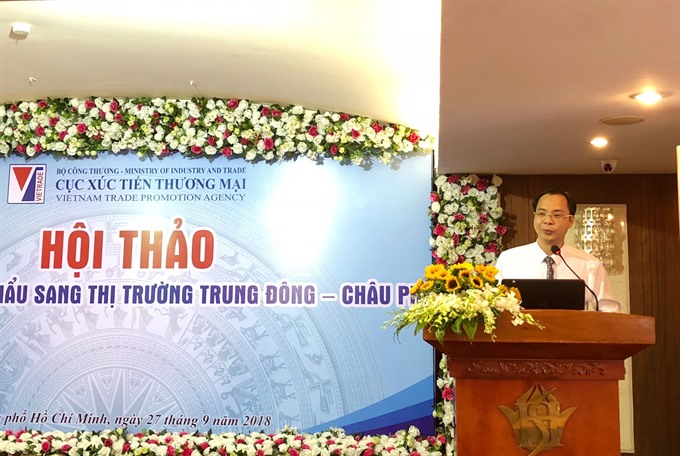The Middle East and Africa are promising markets for Vietnamese exports, but exporters would face challenges there and have to adopt appropriately careful strategies, officials said at a conference in HCM City on Thursday.

The Middle East and Africa are promising markets for Vietnamese exports, but exporters would face challenges there and have to adopt appropriately careful strategies, officials said at a conference in HCM City on Thursday.
Ngo Khai Hoan, deputy director of the Ministry of Industry and Trade’s Asia–Africa Market Department, said the two markets comprise 70 countries with a population of over 1.4 billion and have great demand especially for agricultural and seafood products.
The Middle East has high demand for mobile phones and accessories, computers, farm produce, seafood, garment and textile, footwear, and construction materials.
“The region has harsh natural conditions and so is unable to produce locally and imports 90 per cent of its agricultural and seafood products, offering a good opportunity for Vietnamese firms,” he said.
Value of Viet Nam’s trade with Middle Eastern and African countries has gone up sharply in recent years to US$18.5 billion last year, with Viet Nam’s exports accounting for $11.6 billion, he said.
“Viet Nam accounts for a very small proportion of the region’s imports.”
Bui Thi Thanh An, deputy director of the Viet Nam Trade Promotion Agency, said Africa and the Middle East’s imports were worth $480 billion and $807 billion in 2016 and are expected to reach $1.2 trillion and $1.5 trillion by 2020.
“Therefore, there is plenty of opportunity for Vietnamese firms to export to the markets.”
In addition, their location adjacent to three continents of Asia, Europe and Africa could serve as an entry point to the markets for Vietnamese goods, she said.
“Given the fact that Viet Nam’s traditional markets are gradually getting saturated, enhancing exports to new markets is the right path for Vietnamese businesses.”
However, Hoan said that companies exporting to the two markets have encountered challenges in terms of payment, information, finding partners and fierce competition from other countries.
They need to understand their regulations and Islamic cultural factors such as not consuming alcohol and requiring food and foodstuffs to have Halal certification, he said.
Though the markets do not yet have high food safety standards, they are increasingly adopting trade barriers and so Vietnamese firms should focus on improving food hygiene and safety, he added.
Speaking about her experience doing business with the Middle East and Africa, Chau Kim Yen, general director of Ben Tre Import-Export Company which has exported dried coconut meat to the two markets for decades, said the market has huge demand for Vietnamese farm produce.
But companies have to take a risk with payment because many importers in the two markets do not pay immediately or open letters of credit, she said.
There is also a lack of information about potential business partners and the Government should create a channel to disseminate information to businesses, she said.
Hoan said his ministry would step up trade promotion efforts, provide businesses with market information and negotiate with countries in the regions to promote exports of Vietnamese rice and seafood.
An suggested Vietnamese companies should participate in trade fairs there to meet potential customers. — VNS





